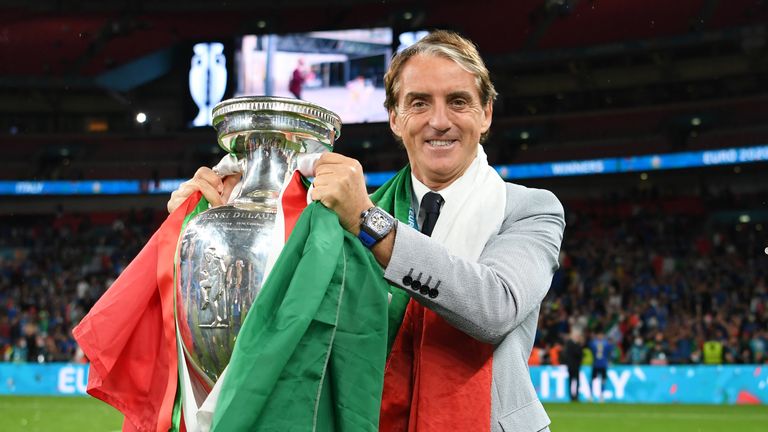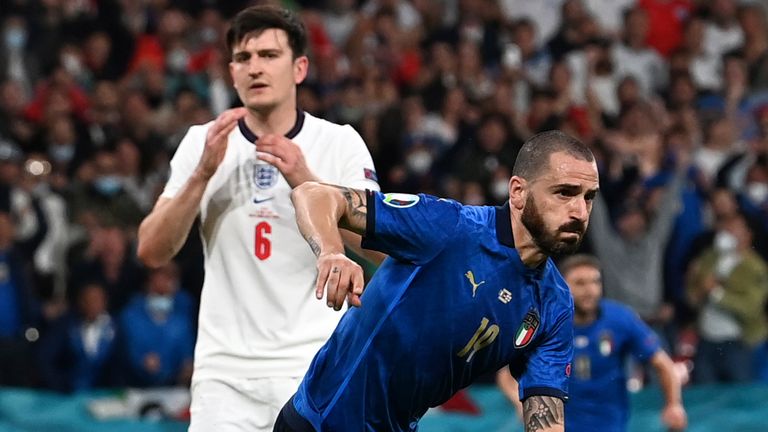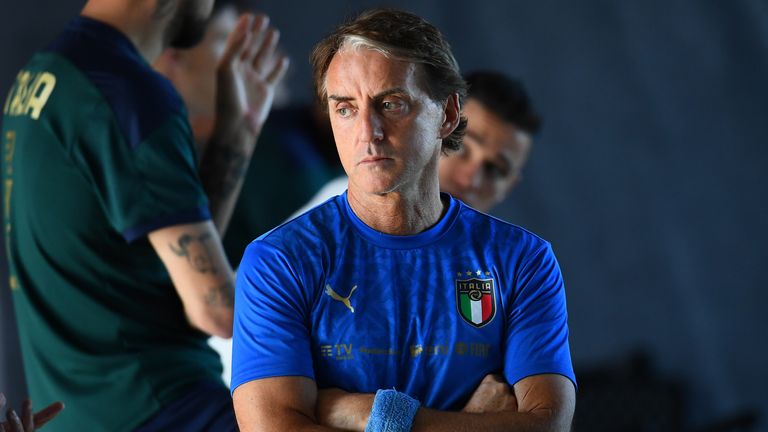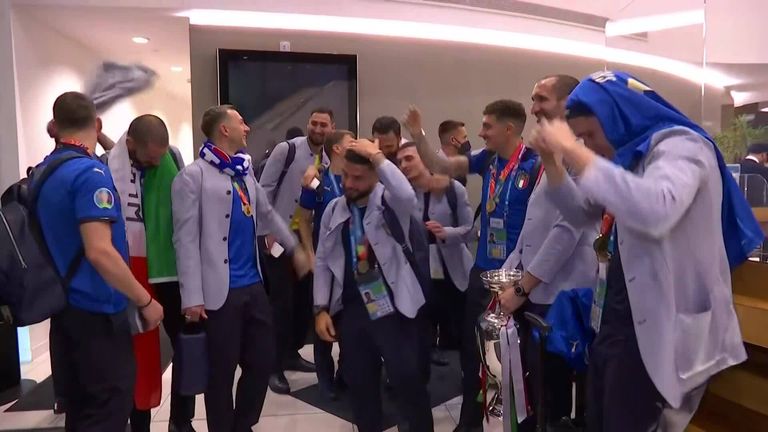Italy win Euro 2020: How Roberto Mancini sparked renaissance by blending Italian coaching ideas
After Italy were crowned as champions of Europe for the first time in 53 years, Adam Bate speaks to coaches in the country to find out how Roberto Mancini's ability to fuse ideas new and old helped turned the nation's footballing fortunes around
Monday 12 July 2021 12:47, UK
Italy were worthy winners. After 34 games unbeaten, how could they not be? It caps an astonishing turnaround under Roberto Mancini. A team that did not even qualify for the World Cup in 2018 offered a glimpse of their talent on the opening night of Euro 2020 and underlined it with an impressive performance in the final.
There were struggles mental and physical along the way. Three times Italy had to go to extra-time. Three times they prevailed. In the final itself, Mancini's team were behind for longer than they had been in the previous 33 matches on this run. They kept calm.
It was a triumph tactical and technical, reflected in their 66 per cent possession. So emphatic has been the revival that the subject of the acclaim is obvious. "The difference is the coach," one prominent Italian coach tells Sky Sports. "We won because of Mancini."
It is a logical conclusion given the ignominy of Italy missing out on a World Cup for the first time in their history just three years ago - what former Pescara coach Vincenzo Melidona describes as the "disaster of Gian Piero Ventura", Mancini's predecessor in the role.
But delve deeper and this Italian renaissance might be about more than one man. The signs have been there. Runners-up at the last two U17 Euros and twice in the U19 final in 2016 and 2018. Italy were semi-finalists at the U20 World Cup in 2017 and 2019.
There has been a sea change in Italian football, a new wave of coaches with fresh ideas. Mancini's record speaks for itself - he has won more titles in the major leagues than the other 23 coaches at Euro 2020 put together - but he has been working in fertile soil.
"The change has already been happening in Italy," Melidona tells Sky Sports. "There is Roberto De Zerbi, there is Vincenzo Italiano, there is Fabio Liverani. All progressive trainers. Now, Maurizio Sarri is back at Lazio. So this typical Italian way has changed."
Mancini has harnessed these ideas, new and old. That has been evident in the key moments at this tournament. Italy's first goal against Switzerland was made in Sassuolo, the influence of De Zerbi's team obvious when Domenico Berardi set up Manuel Locatelli.
"Some of the situations are so like Sassuolo, "says Melidona, in reference to the possession game of the team that has made such a big impression in Serie A. "Like Sassuolo, the Italy of Mancini like to build the ball from the back and use everyone on the field."
Italy's third and final goal in that game was very different. "That was a typical situation of Atalanta. A recovery of the ball very quickly by Rafael Toloi and a quick pass to Ciro Immobile. It is a typical principle of Gian Piero Gasperini, to recover the ball by pressing."
After outplaying Belgium for an hour in a thrilling quarter-final that showcased the smart rotations and interplay Mancini has been able to coax from his team, Italy showed their more traditional qualities had not been forgotten either as they closed it out.
They needed them even more in the semi-final against Spain.
"Spain were aggressive and we had no time in the defensive third so that was the first time that we really had to play in the old Italian way," says Melidona. Giorgio Chiellini and Leonardo Bonucci provide that platform. The latter was man of the match in the final.
- Heartbreak for England as Italy win Euros
- Gareth Southgate: Penalty decisions are on me
- How the teams lined up | In-depth stats and analysis
"We are still the leaders in the defensive phase," says another Italian coach. "Cover, marking, body positioning, posture relating to the ball, the opponent and the team-mates, reading the situation. What Mancini is doing is keeping this strong point of Italy, compact between the lines, the units, but also playing very European."
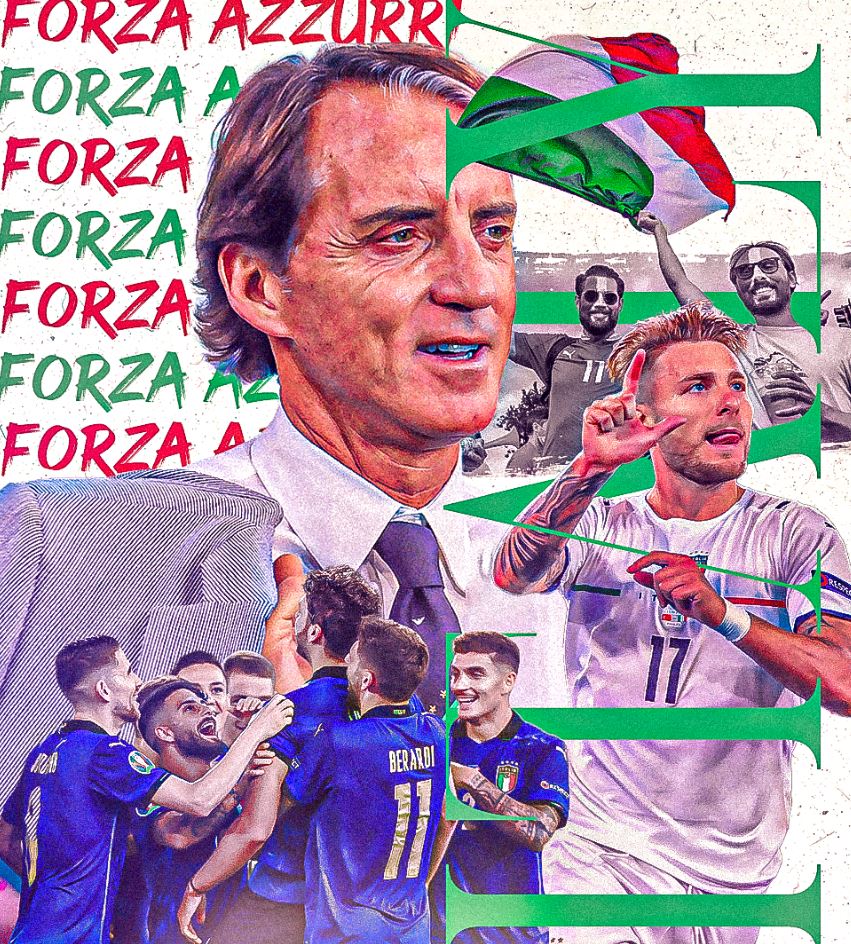
Lessons from abroad have been learned with a positional flexibility rarely seen in international football because such sophistication can take time. Leonardo Spinazzola was a revelation early in the tournament, his presence helping Lorenzo Insigne to shine.
"At the beginning, it seems like Italy play 4-3-3 but when they are in possession they change because there is a rotation of players," says Melidona. "It becomes 3-4-2-1 because the left-back joins the line of midfield and Insigne goes inside. Immobile provides the depth.
"Before Mancini came, it seemed like there was no national team. But after just a year of Mancini working with the players it seemed like the team had been training together month after month, when this was not true, he had only had them for a week at a time."
This improvement echoes the advancements off the pitch, as Aldo Comi, founder of data analysis platform Soccerment, has noted in his dealings with clients. "Italian clubs are starting to feel a deeper urgency to understand technology and data," Comi tells Sky Sports.
"Football is a tactical game in Italy so they are interested in the ability to track spacing between players, but also the spaces between the lines in a formation. Italian coaches probably place more emphasis on tactics and shape than anybody in the world."
Coverciano, Italy's equivalent of St George's Park, but one that has been around since 1958, has had to modernise and many credit the country's coaching hub for this revival. The institution of the so-called C-A-R-P methodology provides clarity for Italian coaches.
C is for Construzione. "Building from the goalkeeper," says Melidona. A is for Ampiezza. "Width, the principle of using the full-backs high." R is for Rifinitura. "The space that we use between the defensive line of the opponent and the line of midfield." P is for Profondita. "The depth that Immobile provides during the match, stretching play."
These principles remain regardless of the personnel.
"Mancini is the first trainer who has given a clear idea to the team. It is a very big job because there are 26 players but if he plays Chiesa or Berardi, nothing changes. Immobile or Belotti, nothing changes. Chiellini or Acerbi, nothing changes. Locatelli started the tournament and played well but when Verratti came in nothing changed."
Not everyone is convinced of Coverciano's importance, however.
"Italy are not doing well because of this methodology, these are very simple concepts," says another Italian coach with experience at home and abroad.
"I have coached in England. If you say even to a foundation-level coach here that Italy have turned it around because they are doing this, he will say that he is training this every day.
"You will find the same ideas just with different words for them in England, Spain, Belgium or Germany. It is just some terminology. These ideas are not that sophisticated. Any good coach just starting out knows this. The difference is how you use it.
"Mancini has chosen the right players in the right positions and has them doing the right things at the right time. The coach must know the best solutions. Mancini has done that."
It is a familiar tale, the search for meaning in the aftermath of success. France's win in 1998 was explained in the context of the work done at Clairefontaine, Spain's triumphs defined in terms of a generation of talent forged at La Masia. Germany's rebuild was seen as a wider story about their own coaching revolution.
Italy's renaissance will spark similar discussions. "That is natural," concludes Melidona. "If you win, it is like a car and everyone wants to jump in the car." Nobody in Italy is likely to forget it was the man in the driving seat who guided them to glory.


